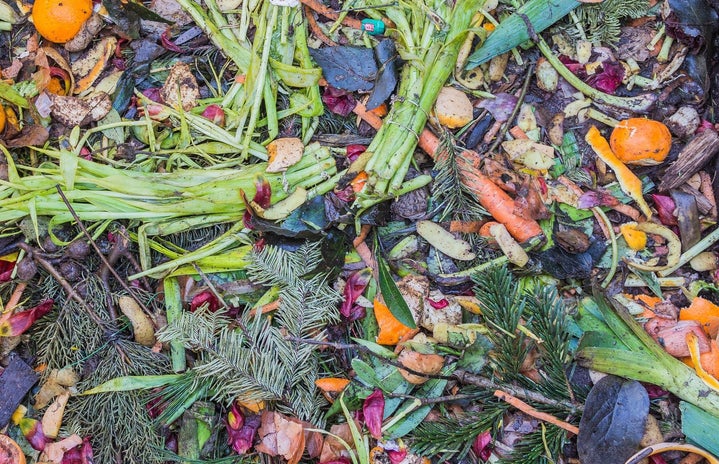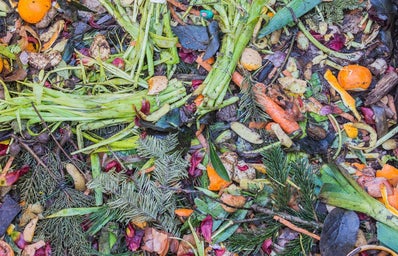Food waste is something most of us are pretty familiar with. From the leftovers that get pushed to the back of the fridge to the fruit and veggie scraps you throw out when making a meal, most people end up throwing away a large portion of the food they buy each week. Instead of sending it to landfills, where it releases a methane greenhouse gas, it’s simple to divert this kind of waste by composting it!
So, what is compost?
Compost is an organic material and comprises three basic ingredients: brown materials, green materials, and water. Brown materials— such as newspapers, cardboard, shredded paper, and eggshells— add carbon to compost, while green materials—like fruit and veggie scraps, coffee grounds, and tea bags—add nitrogen to the mix. Water helps break everything down!
It is used in various ways, ranging from compost tea to be used on farms to enrich the soil with beneficial microorganisms to a simple fertilizer for plants or gardens.
What’s easier than thinking about everything that can be composted is focusing on what can’t. As a general rule, animal products shouldn’t be composted, nor should oil or foods containing high oil content. This includes dairy, meat and fish. It’s recommended to avoid adding pet waste, too, including kitty litter, to compost, as it can bring harmful bacteria into the mix or attract pests. And, of course, no plastic!
How can I start composting?
Many cities have community compost programs in which composting is available to all and used in local gardens. In my town just outside of Dallas, there isn’t a community compost program yet, but a few companies and organizations collect compost for a small fee or for free. This is the case in most cities, so check with your local farmer’s market or do a quick Google search for composting resources in your area!
For the past few months, I’ve been composting with a Compost Carpool local business that provides me with a clean bucket to fill with food scraps, cardboard, and other compostable goods. Once a week, buckets are collected and replaced with fresh ones across my town and neighboring towns.
Compost Carpool also has weekly community pick-ups at farmers’ markets and other locations for those who don’t want to pay extra for weekly pick-ups. Since it’s winter, my town’s farmer’s market is only open a few times a month, so I went with the weekly option. During the summer months, when the farmer’s market happens every weekend, I’ll switch to the community drop-off membership! With Compost Carpool, all compost collected is donated to local farms and community gardens.
Between coffee grounds, banana peels, avocado pits, avocado peels and tea leaves, my family generates a fair amount of compostable waste every day. For a while, my parents weren’t sure we had enough food waste to justify committing to composting, but I quickly proved them wrong. As a family of five, we generate enough compost to justify a bucket a week!
We keep our compost bin in the garage, but compost can be kept in a container in your freezer or backyard, as well.
Ditching waste
Many household items can be composted, and many companies are switching to biodegradable products and packaging to reduce waste. Cardboard is the most common material used in biodegradable packaging, but many other items can be composted as well! Bamboo toothbrushes can be composted once the bristles are removed. Toilet paper and paper towel rolls can be composted, and empty tissue boxes after any plastic packaging are removed. Dead plants and their soil can be composted, and so can Christmas trees and flower arrangements!
One of my favorite skincare brands, Meow Meow Tweet, has a ton of entirely biodegradable products! Some of my favorites are their deodorant sticks, vegan lip balms (all three blends are incredible) and Repair Balm. Once you’re finished with these products, they can be tossed into your compost bin!
Since we started composting, I’ve noticed that my family has generated a lot less trash. While we still throw out more food than I’d like to admit, we’re getting better with each grocery store run. At least we know our food waste and regular fruit and veggie scraps are being turned into compost, which is beneficial to all.
Whether you’re learning about compost for the first time or have been thinking about composting for a while but didn’t think you could commit, you should try it out and see what happens! You might just find that it helps you cut down on your waste and encourage you to make biodegradable purchases in the future!
If you decide to go forward with composting, ask your friends, family members, and roommates to join you! Having a support system or group to help keep everyone accountable and provide each other with tips or ideas along the way is always a good idea, and it also helps get more people composting. Over time, this could lead to decreased food waste and trash and get people thinking more about their actions and how they affect others in their community. If nothing else, it is a great bonding experience, and I’ve seen firsthand how excited my parents get when they add things to the compost bin! Composting is a simple, fulfilling task that helps eliminate waste while providing local gardens and farms with fertilizer for their plants and crops. Overall, it’s a win-win. If you’re able to, I highly recommend composting!



